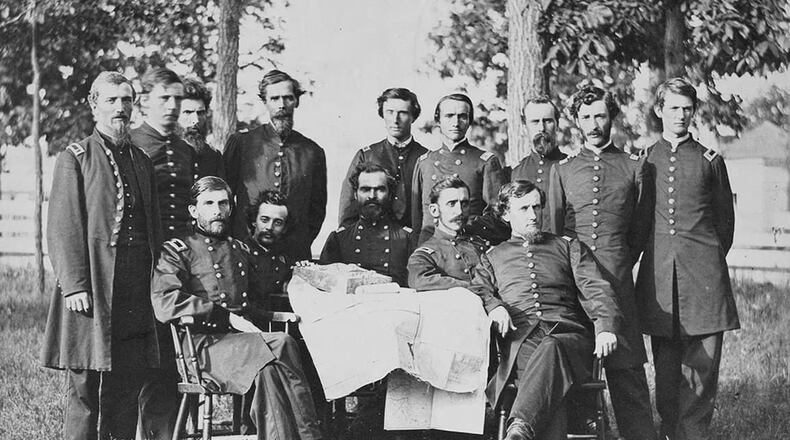Howell Raines calls it the most amazingly counterintuitive fact in all of Civil War history: “White volunteers from the Alabama hills helped Sherman burn Atlanta.”
A mounted regiment of nearly 3,000 subsistence farmers from the state’s hard-scrabble hill country not only joined the Union side in the battle of Atlanta, they were “the point of the spear” in Sherman’s relentless march through Georgia to the sea.
That’s half the story. The subtitle of Raines’ new book tells the rest: “Silent Cavalry: How Union Soldiers from Alabama Helped Sherman Burn Atlanta—and Then Got Written out of History.”
Credit: Crown Publishing
Credit: Crown Publishing
The regiment of Unionist Southerners appears in no history books, and is conspicuously absent from Ken Burns’ monumental PBS series “The Civil War.” This wasn’t an accident, Raines asserts, and he takes meticulous pains to show that the cloak of invisibility historians have draped over this chapter was a purposeful effacing of events.
Raines, 81, will discuss “Silent Cavalry” during an appearance at the Atlanta History Center at 2 p.m. Sunday, April 14.
The former newspaperman (he was executive editor of the New York Times and, earlier, political editor at The Atlanta Constitution) knew about Alabama’s Union sympathizers all his life.
Born in Birmingham, he had family in Winston County, the center of the anti-secession movement in Alabama, and his ancestor ran off at age 16 to join the federal troops.
Credit: Howell Raines
Credit: Howell Raines
Winston County was the scene of violent conflict, where members of the Confederate “Home Guard” carried out assassination campaigns against Unionist Alabamians.
For the past 60 years Raines has been combing through archives, shaking down libraries, interviewing his relatives and piecing together the tale of the First Alabama.
Why hasn’t this story been told before? Raines argues that a variety of actors beginning with the doyenne of the Alabama state archives, Marie Bankhead Owen, were the unreconstructed apologists for the Old South intent on downplaying the anti-Confederacy movement. These Lost Cause enthusiasts would rather not promote the idea that the real heroes of the Civil War weren’t Stonewall Jackson and Robert E. Lee but were the subsistence farmers who fought for the Union. Some 10,000 Black Alabamians, freed or escaped from enslavement, also joined the Union forces, he writes.
Raines traces this attempt at suppression from archivists in Alabama to academics in New York’s Columbia University, in Vanderbilt University in Nashville and the literary circles of Sewanee, Tennessee, where novelist Walker Percy and his childhood friend historian Shelby Foote spent summers.
Foote, the consummate storyteller, would surface as dominant chronicler of the Civil War, and the voice of the Ken Burns series. Raines demonstrates that Foote was familiar with the history of the First Alabama Cavalry and that he never shared the story with Burns.
When Raines asked Burns why the series didn’t include the remarkable tale of the Alabama Unionists, Burns told him he’d never heard of it. Burns acknowledged that Southerners have had an outsized influence on interpreting the events of 1861 to 1865, saying “It’s the only war in which the losers got to write the history.”
Raines said the effort to push a false version of history hasn’t ended. “I think it’s a timely book,” he said, in a phone call from his home in the Pocono mountains of Pennsylvania. “Even though it’s about stuff that happened a long time ago, it illustrates how stolen, ignored, or warped history shapes the ways we think of ourselves as a people.”
To create a persuasive case, Raines devotes much of the book to examining the historians of the late 19th and early 20th century, as well as the primary documents from that time.
For that reason the book spends much more time in the library than in the battlefield. As an action movie, it’s no “Glory.”
But Raines said “If people want drums and bugles and cannons they’ve got Shelby Foote’s magnificent trilogy, and bestsellers like Bruce Catton’s that don’t mention the First Alabama at all.”
He added, “This is a book I thought, if I don’t get it written before I die, it will never be told to a national audience. That’s why I dug into the historiography so deeply.”
Raines said the investigative skills he learned as a reporter were critical in writing “Silent Cavalry.” He also got help from his grandson Jasper Raines, whom he hired as a researcher. The younger Raines was instrumental in turning up roll call reports from the First Alabama that had been misfiled at the Alabama Department of Archives and History as if they were reports from a Confederate outfit.
Raines’ son, Ben Raines is also a historian, and wrote “The Last Slave Ship” after turning up the half-buried remains of the Clotilda. It was the last known ship to carry human chattel from Africa to the U.S. It arrived in Mobile Bay in 1860, under cloak of darkness, because transporting enslaved people had long been outlawed. The owners then rowed the ship up the Mobile River, scuttled and sank it.
If Raines leaves any stone unturned in his pursuit of the truth, it seems that his descendants will keep digging.
IF YOU GO
Howell Raines discusses “Silent Cavalry: How Union Soldiers from Alabama Helped Sherman Burn Atlanta — and Then Got Written out of History”
2 p.m. Sunday, April 14. $10; $5 members. With a book included: $35; $30 members. Atlanta History Center, 130 West Paces Ferry Road NW, Atlanta. atlantahistorycenter.com.
About the Author
Keep Reading
The Latest
Featured





